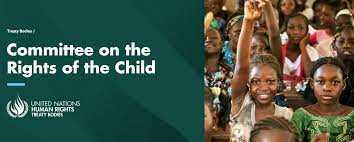
Michael Mashiri
The United Nations Committee on the Rights of the Child has declared children’s right to a clean, healthy and sustainable environment by issuing United Nations Convention on the Rights of Child General Comment No. 26 which is comprehensive interpretation of the member states’ obligations under the United Nations Convention on the Rights of the Child.
A joint press release by the Ministry of Public Service, Labour and Social Welfare and the Ministry of Environment, Climate and Wildlife in collaboration with Unicef Zimbabwe, said the Convention is clear on the universal children’s rights such as life, survival and development.
“A UNCRC General Comment provides guidance on what these rights imply for a specific issue or area of legislation.
“Explicitly addresses the climate emergency, the collapse of biodiversity and pervasive pollution, outlining countermeasures to protect children,” they said.
They highlighted that, General Comment No. 26 set out that, States are not only supposed safe guard children’s rights from instant distress but to even consider their future.
They added that, there was need for specific awareness on the undue suffering children encounter.
“General Comment No. 26 specifies that States are responsible not only protecting children’s rights from immediate harm but also for future violations of their rights due to States’ actions or inaction today.
“Particular attention is to be paid to the disproportionate harm faced by children in disadvantaged situations, leaving no child and no place behind,” they said.
They said, the 196 States that have endorsed the Convention on the Rights of the Child were encouraged to come with ways that would help in the protection of resources.
Related Stories
They also advocated for children’s views.
“The 196 states that have ratified the Convention on the Rights of the Child are urged to take immediate action, including shifting to renewable energy sources, improving air quality, ensuring access to clean water, transforming industrial agriculture and fisheries to produce healthy and sustainable food, and protecting biodiversity.
“The UNCRC General Comment No.26 states that children’s views must be considered in environmental decision-making and stresses the critical role of climate and environmental education in preparing children to take action, advocate, and protect themselves from environmental harm," they added.
According to Unicef, Zimbabwe’s statute-making apparatus was in line with their priority on children and demands.
“Zimbabwe’s emblematic legislative policy instruments reflect our regard and priority on children’s rights - and their needs - in the critical climate change blueprints including the National Climate Policy and its child friendly version, revised Nationally Determined Contributions and its Implementation Plan as well as the draft National Adaptation Plan.
“The Government of Zimbabwe ensures that the voices of children and young people are captured in the climate change debate and the country’s position towards the annual Conference of Parties to the United Nations Framework Convention on Climate Change, UNFCCC,” statement said.
The government has been supporting schools in the country to put in place disaster risk management plans while strengthening climate change learning, climate-resilient infrastructure, and basic services - such as renewable energy and water supply - and creating more practical learning spaces to foster environmental stewardship amongst Zimbabwe’s children, including through the Clean Green Initiative.
“At the Africa Climate Summit held in Nairobi in September 2023, Zimbabwe reiterated its commitment to intensify adaptation efforts such as early warnings and disaster risk reduction, climate proofing infrastructure, sustainable water management and climate smart agriculture for food and nutrition security.
“This directly reduces the negative impacts of climate change on children. For sustainability, this calls for enhanced action in schools and communities to be better prepared for the more frequent and intense weather events that come with climate change in Zimbabwe.”
The General Comment has been seen as a dire call for countries to prioritise action in every aspect of childhood impacted by climate change, such as the rights of a child to protection from suffering and harm, education, nutrition, safe water, a clean, healthy and sustainable environment.



















Leave Comments